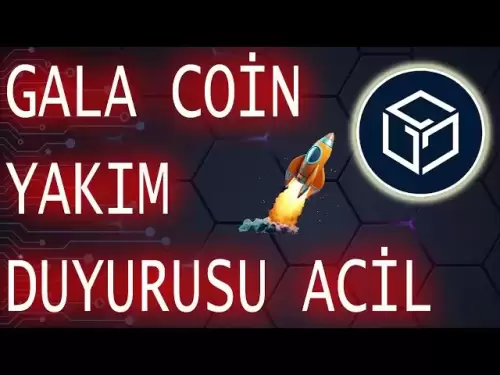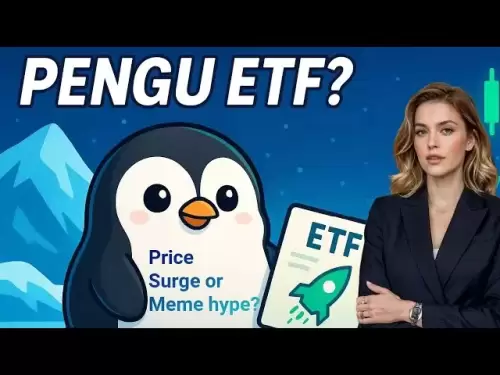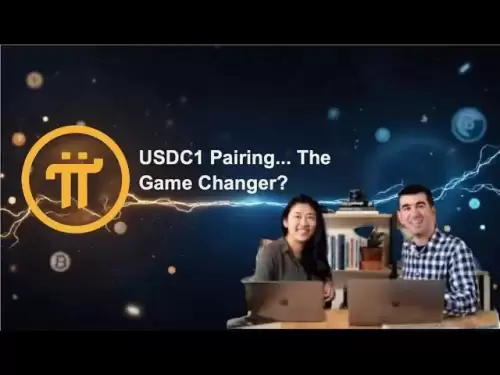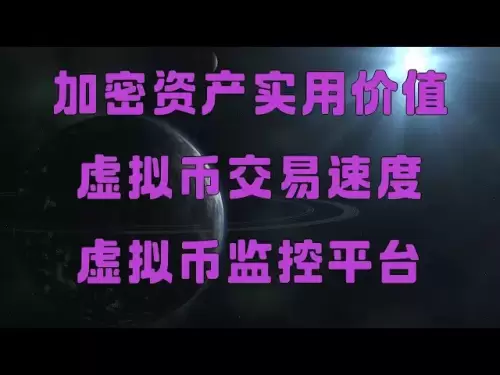-
 Bitcoin
Bitcoin $105,734.0170
-1.51% -
 Ethereum
Ethereum $2,414.7328
-3.26% -
 Tether USDt
Tether USDt $1.0002
0.00% -
 XRP
XRP $2.1748
-2.62% -
 BNB
BNB $647.5663
-1.72% -
 Solana
Solana $148.1710
-3.81% -
 USDC
USDC $0.9999
-0.01% -
 TRON
TRON $0.2799
-0.02% -
 Dogecoin
Dogecoin $0.1586
-4.17% -
 Cardano
Cardano $0.5440
-5.03% -
 Hyperliquid
Hyperliquid $37.0680
-6.59% -
 Bitcoin Cash
Bitcoin Cash $501.2052
-4.01% -
 Sui
Sui $2.6846
-3.47% -
 Chainlink
Chainlink $12.8488
-3.38% -
 UNUS SED LEO
UNUS SED LEO $8.9480
-1.51% -
 Avalanche
Avalanche $17.2059
-3.87% -
 Stellar
Stellar $0.2270
-4.75% -
 Toncoin
Toncoin $2.7889
-3.93% -
 Shiba Inu
Shiba Inu $0.0...01126
-1.76% -
 Litecoin
Litecoin $83.6893
-3.36% -
 Hedera
Hedera $0.1445
-4.49% -
 Monero
Monero $312.4014
-2.58% -
 Dai
Dai $1.0000
0.00% -
 Ethena USDe
Ethena USDe $1.0001
-0.01% -
 Polkadot
Polkadot $3.2920
-3.32% -
 Bitget Token
Bitget Token $4.4629
-1.81% -
 Uniswap
Uniswap $6.5386
-8.42% -
 Aave
Aave $260.3780
-6.01% -
 Pepe
Pepe $0.0...09308
-4.54% -
 Pi
Pi $0.4864
-3.04%
Is there a decentralized exchange (DEX) where I can purchase Request (REQ) coins?
DEXs offer a secure, private, and decentralized alternative for trading REQ tokens, with varying options available based on liquidity, trading fees, and supported tokens.
Dec 26, 2024 at 07:35 pm
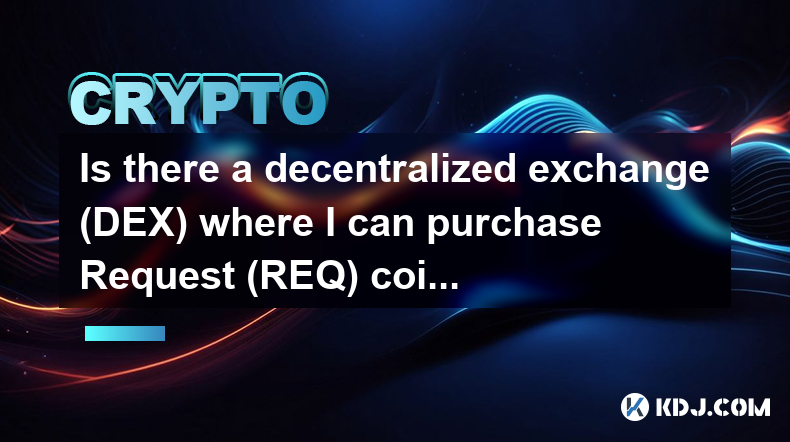
Key Points
- Request (REQ) is a decentralized network for payment requests and invoices.
- DEXs offer several advantages over centralized exchanges, including security, privacy, and control.
- Several DEXs support REQ trading, including Uniswap, 0x Protocol, and Kyber Network.
- Choosing the right DEX depends on factors such as liquidity, trading fees, and supported tokens.
Detailed Explanation
1. Understanding Request (REQ)
Request (REQ) is a decentralized network that enables the creation, tracking, and management of payment requests and invoices. It utilizes blockchain technology to provide transparency, immutability, and reduced transaction costs. REQ tokens are used as the native currency within the Request network and facilitate fee payments and governance.
2. Advantages of Decentralized Exchanges (DEXs)
DEXs differ from centralized exchanges by employing a decentralized architecture, where users maintain control of their assets and transactions are processed through a distributed network. This offers several advantages:
- Security: DEXs eliminate the risk of a single point of failure, reducing the susceptibility to hacking and fraud.
- Privacy: DEXs do not require user identification or personal information, ensuring greater transaction privacy.
- Control: Users retain custody of their private keys and have direct control over their assets, eliminating the reliance on third parties.
3. DEXs Offering REQ Trading
Multiple DEXs support REQ trading, providing users with various options for decentralized token exchange:
- Uniswap: Uniswap is a leading decentralized exchange that facilitates automated token swaps using a liquidity pool model. It has a high liquidity pool for REQ, enabling seamless and efficient trading.
- 0x Protocol: 0x Protocol allows for the creation of decentralized applications (dApps) for token exchange. It offers open-source libraries and tools that developers can utilize to build customized DEXs supporting REQ.
- Kyber Network: Kyber Network is another popular decentralized exchange that provides on-chain liquidity aggregation. It automatically sources liquidity from multiple reserves, ensuring optimal prices for REQ trading.
4. Choosing the Right DEX
When selecting a DEX for REQ trading, consider the following factors:
- Liquidity: Liquidity refers to the availability of trading pairs and the volume of orders. Higher liquidity ensures better price stability and execution efficiency.
- Trading Fees: DEXs typically charge fees for trading operations, which vary depending on the platform. Choose a DEX with competitive fees to minimize transaction costs.
- Supported Tokens: Ensure that the DEX supports REQ tokens and the other tokens or pairs you may want to trade.
- User Interface and Accessibility: Consider the ease of use and accessibility of the DEX platform. Look for DEXs with user-friendly interfaces, clear documentation, and adequate support.
- Security: Assess the security measures implemented by the DEX, including smart contract audits, reserve management practices, and user identity verification requirements.
FAQs
- What are the benefits of using REQ tokens?
REQ tokens facilitate fee payments within the Request network and provide governance rights to holders. They allow users to participate in decision-making and vote on network improvements.
- Is REQ traded on centralized exchanges?
Yes, REQ is traded on several centralized exchanges, including Binance, Coinbase, and Kraken. However, these exchanges do not offer the same level of security and privacy as DEXs.
- How do I ensure the security of my REQ tokens when using a DEX?
Store your REQ tokens in a secure cryptocurrency wallet and maintain control of your private keys. Exercise caution when connecting to unknown dApps or interacting with unverified smart contracts.
Disclaimer:info@kdj.com
The information provided is not trading advice. kdj.com does not assume any responsibility for any investments made based on the information provided in this article. Cryptocurrencies are highly volatile and it is highly recommended that you invest with caution after thorough research!
If you believe that the content used on this website infringes your copyright, please contact us immediately (info@kdj.com) and we will delete it promptly.
- Coinbase, Crypto, and Amazon: A New Era of Financial Integration
- 2025-07-02 12:30:12
- Binance, Airdrops, and Market Share: A 2025 Crypto Powerhouse
- 2025-07-02 12:30:12
- Crypto Trends 2025: MAGACOIN FINANCE Surges, Ethereum Mining Evolves, and XRP Payouts Innovate
- 2025-07-02 10:30:12
- Ethereum, MAGACOIN FINANCE, and Inflation: A Shift in Crypto Investor Focus
- 2025-07-02 10:30:12
- Kangaroos, Coin Purses, and a Hop Through Money History: You Gotta See This!
- 2025-07-02 10:50:15
- Arbitrum, Robinhood, and ARB Price: Is a Rebound on the Horizon?
- 2025-07-02 10:50:15
Related knowledge

How to customize USDT TRC20 mining fees? Flexible adjustment tutorial
Jun 13,2025 at 01:42am
Understanding USDT TRC20 Mining FeesMining fees on the TRON (TRC20) network are essential for processing transactions. Unlike Bitcoin or Ethereum, where miners directly validate transactions, TRON uses a delegated proof-of-stake (DPoS) mechanism. However, users still need to pay bandwidth and energy fees, which are collectively referred to as 'mining fe...

USDT TRC20 transaction is stuck? Solution summary
Jun 14,2025 at 11:15pm
Understanding USDT TRC20 TransactionsWhen users mention that a USDT TRC20 transaction is stuck, they typically refer to a situation where the transfer of Tether (USDT) on the TRON blockchain has not been confirmed for an extended period. This issue may arise due to various reasons such as network congestion, insufficient transaction fees, or wallet-rela...

How to cancel USDT TRC20 unconfirmed transactions? Operation guide
Jun 13,2025 at 11:01pm
Understanding USDT TRC20 Unconfirmed TransactionsWhen dealing with USDT TRC20 transactions, it’s crucial to understand what an unconfirmed transaction means. An unconfirmed transaction is one that has been broadcasted to the blockchain network but hasn’t yet been included in a block. This typically occurs due to low transaction fees or network congestio...

How to check USDT TRC20 balance? Introduction to multiple query methods
Jun 21,2025 at 02:42am
Understanding USDT TRC20 and Its ImportanceUSDT (Tether) is one of the most widely used stablecoins in the cryptocurrency market. It exists on multiple blockchain networks, including TRC20, which operates on the Tron (TRX) network. Checking your USDT TRC20 balance accurately is crucial for users who hold or transact with this asset. Whether you're sendi...

What to do if USDT TRC20 transfers are congested? Speed up trading skills
Jun 13,2025 at 09:56am
Understanding USDT TRC20 Transfer CongestionWhen transferring USDT TRC20, users may occasionally experience delays or congestion. This typically occurs due to network overload on the TRON blockchain, which hosts the TRC20 version of Tether. Unlike the ERC20 variant (which runs on Ethereum), TRC20 transactions are generally faster and cheaper, but during...

The relationship between USDT TRC20 and TRON chain: technical background analysis
Jun 12,2025 at 01:28pm
What is USDT TRC20?USDT TRC20 refers to the Tether (USDT) token issued on the TRON blockchain using the TRC-20 standard. Unlike the more commonly known ERC-20 version of USDT (which runs on Ethereum), the TRC-20 variant leverages the TRON network's infrastructure for faster and cheaper transactions. The emergence of this version came as part of Tether’s...

How to customize USDT TRC20 mining fees? Flexible adjustment tutorial
Jun 13,2025 at 01:42am
Understanding USDT TRC20 Mining FeesMining fees on the TRON (TRC20) network are essential for processing transactions. Unlike Bitcoin or Ethereum, where miners directly validate transactions, TRON uses a delegated proof-of-stake (DPoS) mechanism. However, users still need to pay bandwidth and energy fees, which are collectively referred to as 'mining fe...

USDT TRC20 transaction is stuck? Solution summary
Jun 14,2025 at 11:15pm
Understanding USDT TRC20 TransactionsWhen users mention that a USDT TRC20 transaction is stuck, they typically refer to a situation where the transfer of Tether (USDT) on the TRON blockchain has not been confirmed for an extended period. This issue may arise due to various reasons such as network congestion, insufficient transaction fees, or wallet-rela...

How to cancel USDT TRC20 unconfirmed transactions? Operation guide
Jun 13,2025 at 11:01pm
Understanding USDT TRC20 Unconfirmed TransactionsWhen dealing with USDT TRC20 transactions, it’s crucial to understand what an unconfirmed transaction means. An unconfirmed transaction is one that has been broadcasted to the blockchain network but hasn’t yet been included in a block. This typically occurs due to low transaction fees or network congestio...

How to check USDT TRC20 balance? Introduction to multiple query methods
Jun 21,2025 at 02:42am
Understanding USDT TRC20 and Its ImportanceUSDT (Tether) is one of the most widely used stablecoins in the cryptocurrency market. It exists on multiple blockchain networks, including TRC20, which operates on the Tron (TRX) network. Checking your USDT TRC20 balance accurately is crucial for users who hold or transact with this asset. Whether you're sendi...

What to do if USDT TRC20 transfers are congested? Speed up trading skills
Jun 13,2025 at 09:56am
Understanding USDT TRC20 Transfer CongestionWhen transferring USDT TRC20, users may occasionally experience delays or congestion. This typically occurs due to network overload on the TRON blockchain, which hosts the TRC20 version of Tether. Unlike the ERC20 variant (which runs on Ethereum), TRC20 transactions are generally faster and cheaper, but during...

The relationship between USDT TRC20 and TRON chain: technical background analysis
Jun 12,2025 at 01:28pm
What is USDT TRC20?USDT TRC20 refers to the Tether (USDT) token issued on the TRON blockchain using the TRC-20 standard. Unlike the more commonly known ERC-20 version of USDT (which runs on Ethereum), the TRC-20 variant leverages the TRON network's infrastructure for faster and cheaper transactions. The emergence of this version came as part of Tether’s...
See all articles





















